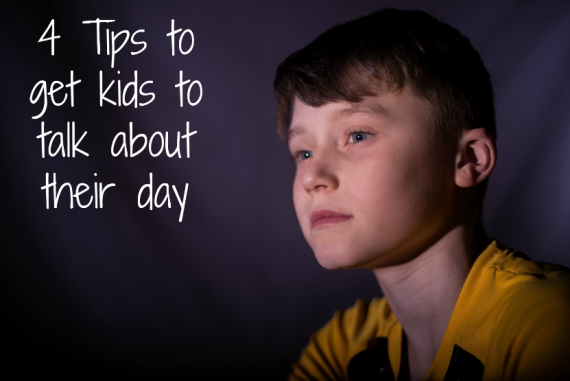It has happened to all of us. You pick up your child at school or you walk in the door at the end of a long day. You are so excited to hear about your child’s day – the ups and downs, what made your child happy and what didn’t, about friends and what your child learned at school. So you say, “Hi honey! How was your day?” The answer: “Good”. And then you probe, “What did you do today?” The answer: “Nothing”.
Those one-word responses can be very disheartening and make parents feel frustrated because they feel like their kids don’t want to tell them about their day, or share their thoughts and feelings. Here are a few proven strategies to get your kids talking. My daughter and two sons are now adults; they are 22, 20 and 19 and I’m very lucky because they still like to talk, and I still use these same strategies to open up conversations with my kids.
Remember, this takes practice!
Create the conditions for dialogue
Instead of questioning, share observations. For example, “It looks like your school bag is heavy today!” or “I noticed that you came out of school looking so happy today.” And then stop talking. Wait for your child to respond when he/she is ready. Try not to be (too) judgmental or question too much when your child responds. Comments like “sounds interesting”, “wow” or just nodding will help your child continue to feel comfortable to share stories and feelings with you.
Girls and boys tend to like different ways of communicating
For boys, I have found that side by side conversations are best (eg. on the couch, in the car, beside each other at the dinner table or at a breakfast bar). Boys tend to feel more comfortable when they aren’t eye to eye when speaking about their feelings. For girls, sit across from them. Girls tend to like the face-to-face interaction more than boys, and you may be surprised that this little change makes a big difference in how much your child will speak to you.
Do your best to put have a time at the end of the day with no screens or technology
It’s ideal to have a meal together but if you can’t, then share some together time before bed, sharing a storybook or small snack before bed. You’ll be surprised how much more kids speak when they aren’t distracted by technology.
Tell stories about your day, or something you read or viewed
Just initiating any kind of conversation encourages responses. I often shared experiences and told stories/shared observations with my kids and they didn’t stop talking in response.
Let me know what you tried and what worked (or didn’t)! You can tweet me at @DrBrendaDzaldov.
Brenda holds a PhD from the Ontario Institute for Studies in Education/University of Toronto, where she is an instructor in the Master’s programme, specializing in literacy education, special education and well-being, and educational psychology. She has published many books and articles focusing on understanding and improving literacy instruction which you can find here. Her interest in parenting comes from her experiences raising her daughter and 2 sons (23, 21 and 19) who are her greatest joy! You can read one of Brenda’s articles here.
Share this Post








